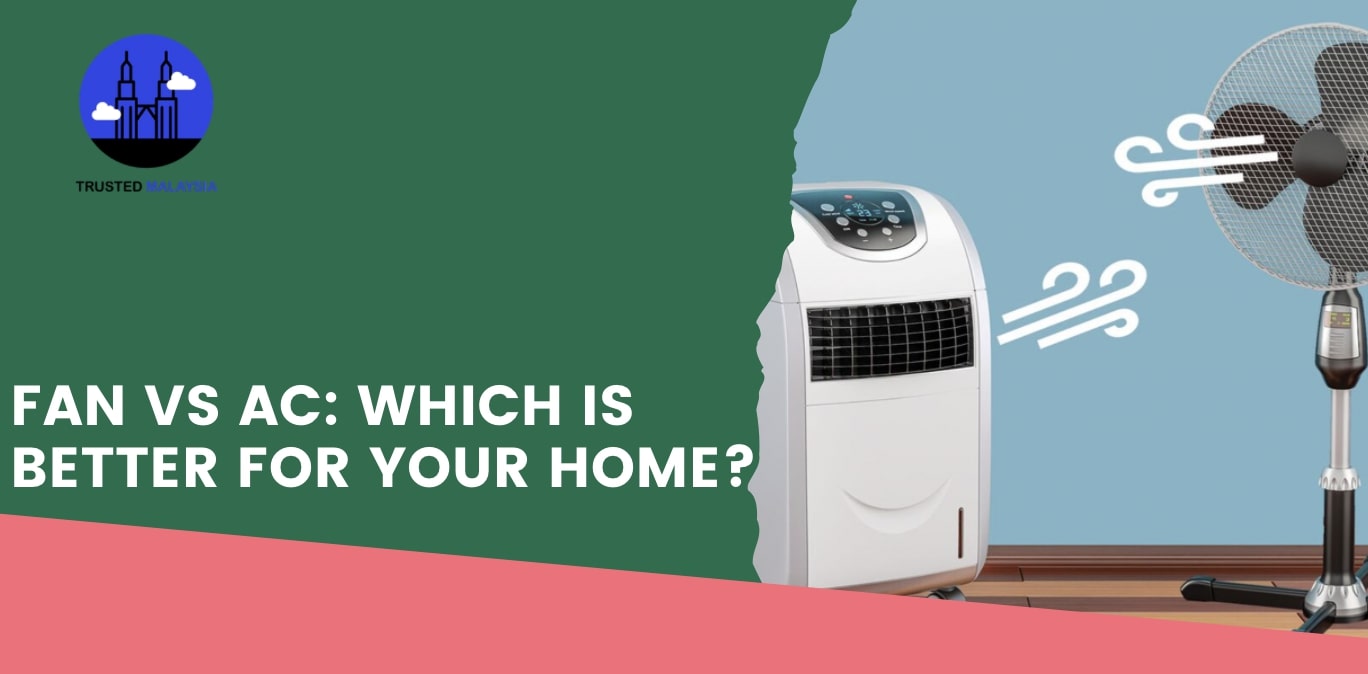Fan vs AC: Which is Better for Your Home?
If you only had to pick one for your house: would you rather choose to have a fan or an air conditioner?
The truth is that in a warm and humid country like Malaysia, it’s hard to do without both. This is with regard to the whole household’s cooling and comfort needs as well as monthly energy expenses.
Nevertheless, in this guide, we will compare both fan and AC, looking at their pros and cons and seeing if it’s actually good you use them both at the same time, and then give you our verdict.
Ready? Let’s go!
Pros and Cons of Fans

Fans work effectively to make the person feel a bit cool and comfortable, but only in low to moderate temperatures.
Unfortunately, it doesn’t stop you from sweating if the room is oven-hot. Much more so if there is direct sunlight in it.
Unlike ACs, they don’t rid the air of dust, moisture, and other contaminants, which won’t be good for people with asthma and allergies. They don’t have the filter and suction process, to begin with.
As a result, you will have to get a separate air purifier to keep the air clean. That will translate to more spending and maintenance work, instead of just upkeeping a single appliance.
The blades of the fan are also a safety hazard. Some users, especially those who work at repair shops and warehouses, use old fans without the cover, making it dangerous for someone nearby.
Also, fans are incredibly easy to set up without any measuring, cutting, or sealing needed. Plus, smaller models can be moved from room to room without any hard work, so everyone can benefit from them.
Pros and Cons of ACs

There’s absolutely no way you can lower the temperature of a room unless you use an AC. A fan only circulates the air around the area and somewhat reduces the unpleasant hot air’s effect on you.
An air conditioner can cool a large room though the unit has to have enough cooling power—or it will work harder.
In effect, you’d have to install another AC (if you’re not planning on a floor-type AC) to prolong their lifespans and the operating and maintenance costs can add up rapidly.
Another essence of air conditioners is they act as a dehumidifier. Their evaporator coils absorb the moisture and dust in your area, leaving the air cooler and cleaner at the same time.
However, they are relatively hard to install and require careful planning. Whether you’re going for a split-type, portable, or central AC, your house has to have the space and suitability for them.
Not to mention that their refrigerants—which are gases that absorb heat from the surroundings—are potentially harmful to the ozone layer, contributing to global warming. This impact is even more with the refrigerants used by older AC units.
Another downside is you would have to call a qualified serviceman once or twice a year. Some of their tasks are to replace the filter, clean the condenser coils, check the wiring, inspect the refrigerant level, lubricate motors and bearings to ensure the unit is efficient and safe to use.
Using Them in Tandem
In short, a fan does not cool the air as an AC does and an AC can’t circulate the air like a fan.
A fan works by sucking the air around it. As it absorbs the air, its blades cut and accelerate it into a breeze that makes you less hot and more comfortable.
An AC unit takes in air from outside, directs it into its coils, which flows to your room. Hence, it can be described as a sort of recycled air, rather than the same kind of air that you get from a fan.
By combining both appliances, you can make your air conditioning efficient because then the cool air will be evenly distributed around the place. Thus, the air can occupy the entire space a lot faster and easier resulting in the person feeling cool and happy.
But, in case you don’t want to get an AC yet, because it’s super expensive, you might find a fan and air cooler pairing a good alternative.
Conclusion
For us, the winner of this bout is the air conditioner. The reason is that they can stifle the regular unforgiving heat waves in Malaysia and remove the irritating allergens in your house or office.
Though possible, it’s often hard to sleep with a fan without sweating in the country. If you don’t wipe them before they dry, you could potentially get a cough, flu, or even get ill.
That said, the initial and operating costs of using an AC over a fan are premium. Multiply the total by the number of ACs you have at home.
Also, we understand that some people are used to having an air conditioner, while others can do well with a fan. In the end, it depends on the person that uses them.
The fan can be an excellent option too because it moves the air around. So, it’s faster than the AC to remove moisture from your body, thereby making you feel cooler. This is a better option for those who are on a budget.
However, we recommend having an air conditioner and fan both, if possible, because this will provide you with the most flexibility and comfort possible.
You can even use them at the same time while raising the temperature of the AC a few levels wherein the air will still feel cool as the fans help to circulate it. By doing this technique, you’ll get great savings year-round!


